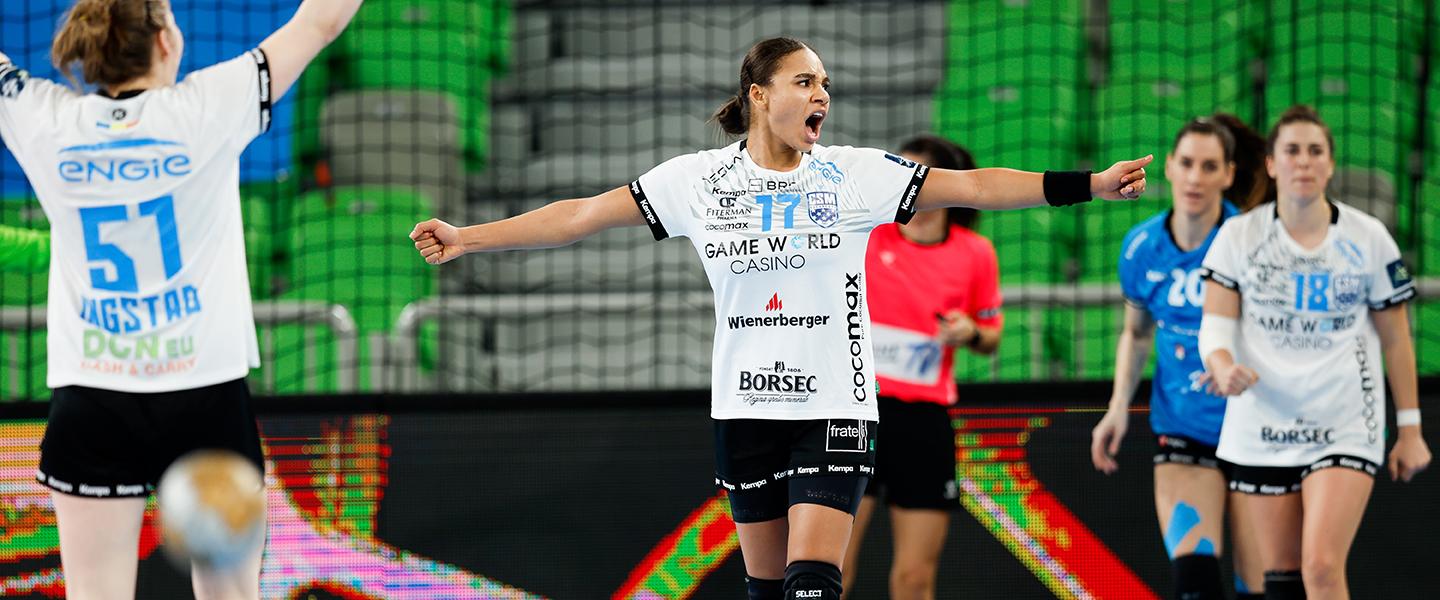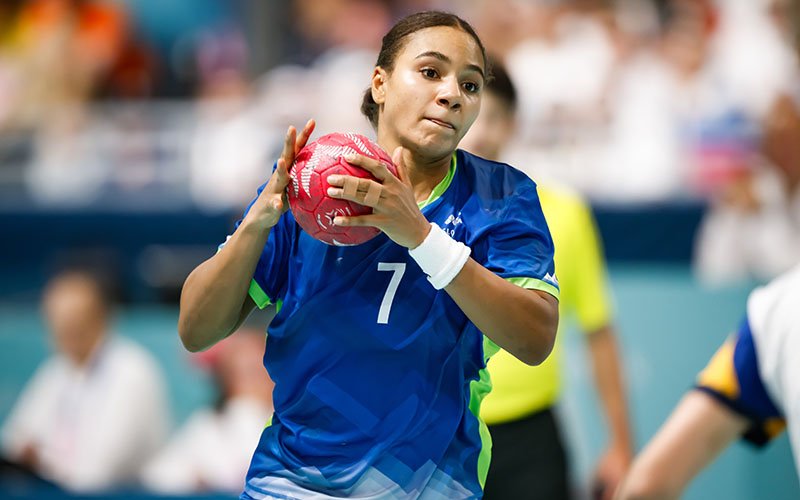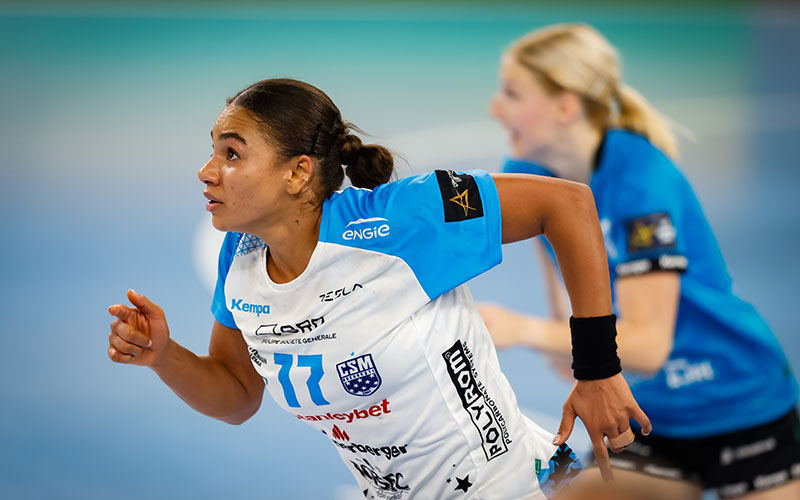Out of the comfort zone: How handball empowered Elizabeth Omoregie’s journey from Bulgaria to the Olympic Games
16 Jul. 2025

From July 12 to 18, fans, players, and communities across the globe will unite for seven unforgettable days dedicated to the sport’s rich history, vibrant present, and promising future. The International Handball Week is here and we are focusing on all disciplines of the sport, highlighting some fantastic stories throughout the handball world. Today, we focus on Elizabeth Omoregie's journey, a fantastic one, starting in Bulgaria and spanning throughout continents, to the IHF Women's World Championship and the Olympic Games.
“I can really see how handball changed my life. I did not come from the wealthiest family—my father worked abroad, we were a family of six, and life was really hard sometimes.”
And then, Elizabeth Omoregie discovered handball.
This is not a Cinderella story, or a fairytale. It is a story without adding some make-up, a player – a human - opening up and how handball helped her become independent and empowered.
During the International Handball Week, the stories of handball players around the world can be heard on IHF.info. And Omoregie’s one is surely one to read, to understand and to inspire.
From a little girl in Bulgaria, to the Olympic Games, Omoregie has done it all in 20 years. But since she was little, she knew that handball was her big love, the sport which she liked the most and the vector for greatness.
But how did the little Elizabeth take on handball?
“In fact, handball was not the first sport I took up. It was athletics. I was really good in the long jump and I was also a sprinter. I took the passion after my sister, of course, looking up to her, and at seven and a half years old, I was already trying for more. But it was really hard, because athletics is a very tough sport,” says Omoregie.
Yet something did not really sit right with Omoregie.

“In athletics, there is so much time to think about failure, to sleep on it. And to think, think, think. It is very hard mentally, it is just you and your coach. While in handball, there is always another game. Even now, as a professional, I still reflect on it in this way. Even for smaller tournaments, you are still playing for the third or the fifth place. So you have to prepare and play again,” adds the centre back.
Therefore, when a handball coach came to an athletic reunion and saw Elizabeth, she was spotted immediately due to her athleticism and speed. She said yes, albeit reluctantly, because she did not know anything about handball, but her first coaches, Gabriela Petrova and Nasko Tabakov, helped her understand the basics of what was “football with the hand”, as Omoregie jokingly tells it now.
“In the first year playing handball, I told my mother that I am invited for some handball tryouts, but I really did not know what it was. She knew, she was a goalkeeper in high school. But after one year of training and playing, I decided this is going to be what I do with my life. I was also there with my sister,” says Omoregie.
Her path towards the top of the sport was anything but conventional. The 28-year-old centre back was born in Athens, with a Nigerian father and a Bulgarian mother. When she was six years old and had already completed one year of school, she moved from Greece to Bulgaria, and had to start all over again with the first year of school, learning the language.
Then, she stayed in Bulgaria for 11 years, until she was 17 years old, studying and training for handball. Omoregie says she can speak four languages now – Bulgarian, Serbian, Slovenian and English – and can understand and speak a bit of Romanian and Greek.
But the first steps into her professional career were not the easiest. In fact, a turning point came when Omoregie was 16 years old and was already a member of the senior Bulgaria national team.

“For a year and a half i didn’t have a club because i had some issues with the club being under contract at that young age, so my only solution was to train with another club, so i needed to travel on weekends, just to have two handball trainings. Luckily, Ii had a lot of friends there, so the weekends felt like time off. I was only playing actual handball for the Bulgaria national team. I had to decide whether to aim for the top or just continue playing at sixteen. And then there was a tournament in Greece, with some national teams, I remember playing against Greece and Israel. I made the all-star team, was the top scorer of the competition, and caught the attention of a delegate there,” says Omoregie.
She was then recommended to Marta Bon, the legendary Krim Ljubljana coach, as the Slovenian side was looking for young players. Around that time, Krim was close of going bankrupt and kickstarted a new project, focusing on young players. Soon, Omoregie was on that list of young players capable to help Krim’s rebuild.
The problem was that the centre back was only 17 years old and had one more year of high school. Was she going to stay in the comfort of her home or go out of the box and dive into the unknown?
“There was another girl from Bulgaria with me, and when I stepped into Slovenia, everyone was so welcoming; it was a new world for me. In Bulgaria, I felt in a small bubble, and when I went there, with all the history they had, I was amazed—everything from the locker rooms to the culture. I was in shock,” says Omoregie.

It was her chance to follow her dream, albeit one which meant that the comfort zone she thriven in was going to be taken away. A new city, a new language, and a single chance to play handball in a more professional setting.
After wrestling with herself for days, Omoregie finally accepted, because she did not have a club, she was training two days per week and she wanted to play handball.
“Honestly, I didn’t know much about where I was heading or the history of Krim. Now, talking with my colleagues, it feels like a very different world for me, and I tell them they should feel lucky. I never really watched Champions League, World championships, or followed competitions before. Nobody judged me for it—I knew nothing,” says the centre back.
“Being from Bulgaria, the culture of handball is not that big. You don’t put the alarm on, hey, on this day, at this hour, there will be a big match, so you can watch it. So I did not know anything about the Champions League back then, the format, the teams playing, nothing,” Omoregie says.
Still, she followed her intuition and her dreams. She wanted to be a professional handball player. Everybody was talking about her physical qualities, her potential was huge in the eyes of many.
Soon, she made her debut in the EHF Champions League Women, against Hypo Niederösterreich on 17 October 2014, when she was still a teenager.

“I never dreamed the typical “girls’ dreams”—I just wanted to be better. I was tired of hearing, “Liza, you are so talented, you’re so strong,” but I knew I wasn’t reaching my potential. My sister was in the Netherlandswas the one sending me money. I doubted myself, wondered if I made the right choice. I wanted to prove to everyone that I made the best decision,” adds Omoregie.
And, in retrospect, it was the best decision for Omoregie, no matter how hard the first years have been.
She was immediately welcomed in the team and in 2017, three years later, she got the Slovenian citizenship. Soon, she represented the national team at the EHF EURO 2020 and 2022, as well as the 2021 IHF Women’s World Championship. But the highlight of her international career was surely the Paris 2024 Olympic Games, where Slovenia made their debut in the women’s competition.
“I always I didn't have a doubt that I want to play for Slovenia because first of all, I wanted to play in the European and in the World Championships and in the back in my head, Olympics were always a possibility. I dreamt about being there at Tokyo, but we did not qualify, but this time we made it. But after all, I wanted to go to the Olympics and being in this team and accepting me and me choosing Slovenia. It's wonderful and I'm really grateful,” adds Omoregie.
“The experience has been amazing in Paris and it is something that I will cherish for the rest of my life.”
Now, the centre back has taken a break from international handball and this was a decision not taken lightly, focusing on her well-being and taking care of her body.

“I know I am young, but I was always going to do this, to take care of myself, because I had my share of injuries. Nobody judged me because I did not sing the anthem, my teammates always told me I should do whatever makes me feel good. But when some players retired, such as Ana Gros, Barbara Lazovic or Tamara Mavsar, I knew I was not going to play for the national team anymore. I am truly grateful to Slovenia for everything,” says Omoregie.
Indeed, Omoregie has reached the peak and has played with and against some of the best players of the world. And it all comes from her innate competitive spirit and a simple wish: to be independent.
“I have been living on my own since I was 17 years old, taking care of myself and trying to be better in every aspect. And this is what handball taught me, to become better every day. To train harder, to give everything,” adds the Greek-born player.
And even in the most difficult moments, Omoregie stayed calm and patient and kept most to herself.
“Going totally out of my comfort zone, my sister has always been the closest to me and knew everything. I kept my emotions to myself; my family probably had other struggles,” says Omoregie.
Now at 28, she has been playing at the highest level, entering her eighth year with CSM București. Omoregie has learnt a lot, even to play out of position and sacrifice for the team. Yet she was guided by some of the best players in the world, such as Cristina Neagu, Andrea Lekic, Dragana Cvijic, Carmen Martin and Jelena Grubisic.
“I am grateful for everything handball gave me. It’s been a special ride,” concludes Omoregie.

